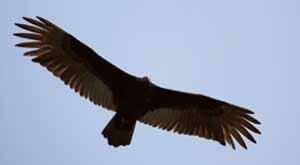
Dead turkey vulture on Decorah radio tower might not scare other turkey vultures
Luther College biology professor Tex Sordahl says putting a dead turkey vulture on top of the radio tower off Linden Street in Decorah might not be enough to scare away the birds.
Sordahl should know--he and three former students spent time studying the habits of the birds starting in the early 2000s.. Sordahl says turkey vultures "are comparatively mild-mannered," but he notes "it's hard to get them to change their minds."
He says while he and his students were observing the birds' habits, several houses were being constructed nearby, but the construction noise wasn't enough to chase away the birds.
That's because the turkey vultures have been roosting in the area for over 20 years. Turkey vultures are social birds, notes Sordahl, so they like to hang out in groups. He says he's seen as many as 300 turkey vultures in a group in Decorah.
Sordahl likes the birds. He says they do a better job of removing carcasses and other debris than do raccoons, skunks or coyotes. Turkey vultures numbers peak in August and September in Decorah, then the vultures leave town in October.
But getting the turkey vultures to leave now? Sordahl says that's unlikely. In fact, one of the ex-students he worked with on his study of turkey vultures is now going to graduate school in Florida, where she is studying efforts to get rid of the black vultures. In one case, the vultures descended upon a playground outside a preschool. People tried putting out dead vultures in Flordia--but that didn't work. In fact, says Sordahl, it's pretty hard to do anything that works to scare away vultures.
Site designed and maintained by Iroc Web Design Services©.
Your Small Business Web Design Solutions.™


